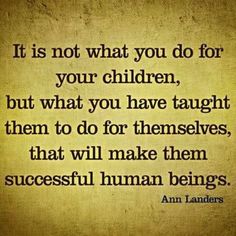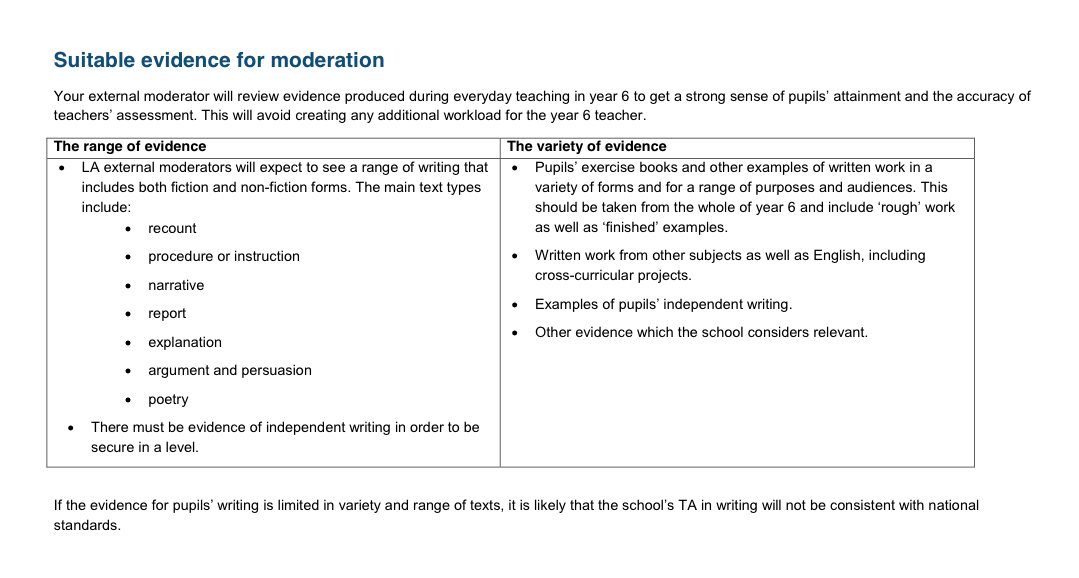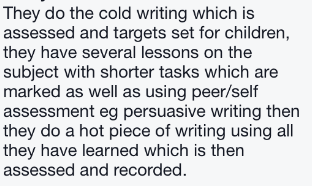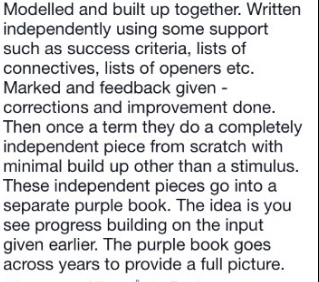 As I travel around schools I am asked about independent and how independent writing should be. There are many different interpretations of 'independent' writing in schools which has been demonstrated on our Facebook and Twitter pages this week. The range is terrifying. I have spoke to teachers where no independent writing takes place, although staff think what they are delivering is independent writing. I have also spoken to teachers in schools in which independent writing is forced upon children at regular intervals whether they can do it or not! I looked for governmental guidelines and found the following on the assessment guidelines from 2014. (Tap to englarge) It clearly states what independent writing is and how there must be evidence of it in order to give a level or an assessment. It doesn't clearly explain though what independent writing actually is. One phrase I often here is 'Independent at the point of writing.' This is often used when teachers build up to a piece of writing and then tell the children to complete an extended piece based upon their learning, the phrase 'Hot writing' seems to becoming more and more prevalent too. However, if some schools are asking children to only write cold pieces for assessment and other schools are allowing teachers to have a lot of input immediately prior to the writing outcome are the children all on a level playing field? The question is perhaps then how do we teach skills and then assess them afterwards? The answer maybe is a gap, a gap between the taught skills and then assessing them. The length of this gap depends on the age of the child.
I would love to hear your views on this, please share them in the comments below.
Many Thanks Rob
14 Comments
mike highton
17/9/2015 10:42:15 am
Hi Rob - expereinced all of the above across different schools. Hot/Cold tasks are current. Success Criteria is considered as not good - pupils consider failure if not used???
Reply
Katie
18/9/2015 07:45:06 am
Reply
Peter
20/9/2015 06:57:34 pm
This drives me mad. As an adult, I would not expect to have to write ANYTHING without being able to refer to guidance to help me. That may be a simple list of features, it may be about effective structure, it may be a reminder of how to reference correctly. The idea that a primary age child should be judged on a piece of writing without any support is, to my mind, literally absurd. We are asking more of them than we are of ourselves! How many teachers at primary level can rattle off all the features of all the different genres? How many have to double check the difference between a legend and a myth before they plan their unit.
Reply
Hannah
22/9/2015 03:58:10 pm
Totally agree with you Peter. We expect children to jump through hoops that we wouldn't jump through ourselves. Children should be supported all the way in producing writing. Editing is an important skill which we teach in school. Where is the opportunity for this in assessment if children are expected to produce the perfect piece first time round? How many times do we re-read and amend what we write before we are happy with something. Can we write a lovely piece of narrative without some great inspiration behind it? Cold writing is just that....flippin' cold.
Reply
Carl Ayre
27/10/2018 11:23:57 am
Right on brother!
Reply
11/6/2023 04:53:29 pm
I totally agree with you۔ I would like to give children word mats and checklist to remove the burden because writing involves a thought process and variety of skills that could be a very burdensome task for children۔ What do we want ۔۔۔ inculcate the love for writing or simply hate it ?
Reply
Charlotte
23/9/2015 06:07:00 am
Having worked in publishing, prior to jumping ship to teaching, I find the ehole independent writing assessment process ludicrous. It bears no relation to any stage of writing I have ever encountered. Surely the most valuable tool we teach is the ability to find the best model and then learn how to adapt it to the needs of your communication.
Reply
David O
25/9/2015 09:44:12 pm
Interesting post, thanks very much. This question pops up at virtually every moderation meeting I attend. I have some excellent writers in my class and always get asked "how much support did they have for this?" The answer? The same amount of support they had for the last piece of writing in this genre. However, I can show they have independently applied the skills they learnt in their last piece. For example our latest narrative focused on varied openers. Last term we studied complex sentences. Despite not being reminded of how to write in complex for almost 10 weeks, they could still use complex sentences. Hence, independent application of a skill and progress recorded. Next time round I'll focus on another aspect and check to see whether they are still independently applying all there other skills.
Reply
Kate
10/11/2015 06:29:15 am
What's the point of coming to school if they aren't actually going to be taught? A good input is our job. I understand the need for independent writing and I understand the government want and need their good scores but when did we forget that these are still children were talking about!
Reply
Matt
10/11/2015 07:00:59 am
My friend is an author. He writes something, it gets torn apart and sent back. He re-writes, it gets more editing and sent back. He re-writes it and it may finally be ok. I used to work at a newspaper. I would write something and it would get checked by my line editor, a sub-editor and then then the editor. At all times I could talk to my colleagues and look at similar work. Expecting children to write independently is complete nonsense, nowhere in this world will you find published, academic work that is not written without support and help.
Reply
Thank you for this thought-provoking post. I agree with all the comments above.
Reply
Nina
12/11/2015 06:38:35 am
Even within one school just how independent, independent writing is varies, even with guidance. I think the problem being is some teachers see it as an assessment of their teaching rather than an assessment of the children!
Reply
Fran
4/2/2018 03:58:31 pm
I work with special needs KS1 and KS2 children and this question is often on my mind when we come to do a longer piece of writing. For them to succeed in their writing, there needs to have been a large amount of support and scaffolding in place building up to a larger piece of writing. How then, can I say that they have written independently?
Reply
Leave a Reply. |
Archives
July 2020
Categories
All
|




 RSS Feed
RSS Feed
